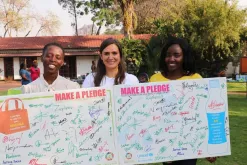Ivy Chinogwenya, national UN Volunteer for Climate Change with UNICEF in Zimbabwe makes a difference by finding ways to mitigate pollution and increase responsible consumption with children and their families. Read below her first-hand account of her assignment and the work she is doing in the area of climate action.
Working with UNICEF as a UN volunteer over the past year, my assignment included building awareness among staff on climate change, its impact and how we can mitigate its effects. I also advocate for sustainable practices in the way people consume energy and resources and manage waste both at work and in their personal lives. These efforts are in line with one of the targets of Sustainable Development Goal 13: to improve education, awareness-raising, human and institutional capacity on climate change mitigation, adaptation, impact reduction and early warning. As former UNICEF Executive Director, Anthony Lake said, “The effects of climate change – diseases, droughts and floods that destroy food sources and livelihoods – further exacerbated risks to children and deepened deprivation for millions. Crushing poverty and widening disparities in health, education and protection undermined the lives and futures of millions more.”
To help ‘green’ UNICEF Zimbabwe, I send out monthly ‘Green Friday’ emails to more than 140 people with up-to-date information about the environment and reminders of ways to save energy and reduce waste. For example, it serves to remind staff to turn off lights and electronics when offices are not in use, and to bring plastic bottles in for recycling.
I also organize events such as the ‘Green Fair’ which put a focus on plastic pollution and its impact on the environment. Held in UNICEF’s green environs, it was attended by a number of UN staff and representatives of the United Nations Greening Committee. Participants each received a re-useable glass water bottle and a fabric shopping bag and made a collective public pledge of commitment to avoid single-use plastic. The event and pledges were further amplified on UNICEF’s social media platforms. Four months after the event, I realized notable evidence that these actions are starting to yield positive results. More staff increasingly use refillable glass bottles for drinking water during meetings, and UNICEF staff members have even been heard reminding each other not to buy water in plastic bottles. As more people share ‘green emails’ and reach out for guidance on how to lead environmentally sustainable lives, there is a clear indication that a beautiful Greening Journey at UNICEF in Zimbabwe has began in earnest.
My ambition is to see more United Nations staff living sustainably, and in turn influencing the world to tackle environmental challenges of our times through actions.
In recognition of this year's World Environment Day, I hope that more of us can make the bold stepse and go green in our day-to day choices before it is nolonger tenable to survive in our one and only planet earth.

